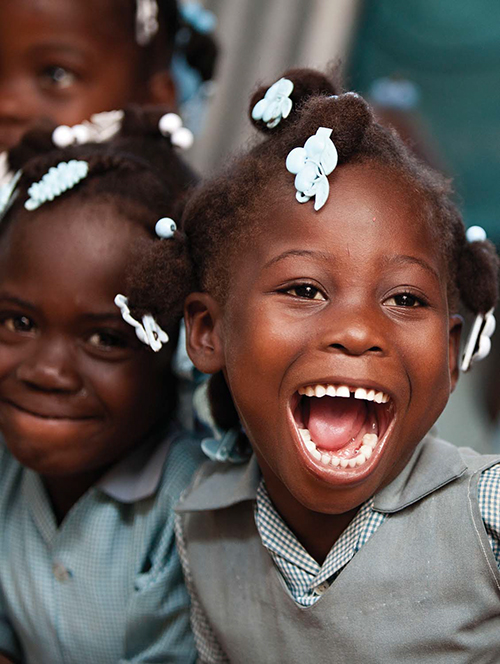When CarolAnn Daniel, Ph.D., arrived in Haiti to volunteer in the wake of the 2010 earthquake, she had no idea that she would end up studying violence among displaced Haitian youth and women.
 Helping displaced Haitian communities reclaim their identities and recover their livelihoods
Helping displaced Haitian communities reclaim their identities and recover their livelihoods
When Associate Professor CarolAnn Daniel, Ph.D., arrived in Haiti to volunteer in the wake of the catastrophic 2010 earthquake, she had no idea that she would end up devoting her professional career to studying everyday violence among displaced Haitian youth and women. Several months after Dr. Daniel’s volunteer stint was over, she returned to Haiti to teach a set of workshops and quickly noticed that an inordinately high number of young girls in tent cities—makeshift settlements built for displaced residents—were pregnant. “I knew Haiti had one of the highest HIV rates outside Africa, so I was alarmed by what I saw,” Dr. Daniel said. “I started thinking about sexuality and reproductive health in these communities and how I could help fill gaps in this area.”
Seven years later, more than 60,000 people in Haiti are still displaced and deprived of adequate protection or services. Dr. Daniel’s exhaustive studies have formed the basis of guidelines that aim to reduce the risk of violence for youth living in tent cities. Her research has two primary goals: first, to provide empirical data that strengthens policy foundations for HIV- and STI-related health in Haiti; and second, to promote culturally sensitive practices around HIV prevention and intervention.
Using a mixed-methods approach of individual interviews, focus groups and surveys, Dr. Daniel explores issues like sexual assault, intimate partner violence and food insecurity—all exacerbated by deep-rooted poverty and political strife. “These structural pressures heighten young people’s vulnerability to HIV and create barriers to effective intervention,” she noted. “We’re looking at the ways in which social, cultural and economic factors influence human sexuality.”
In collaboration with faculty from the University of Toronto as well as colleagues in Haiti, Dr. Daniel has implemented a set of innovative methodologies to document the lives of internally displaced, tent-dwelling residents. For example, she believes the photovoice method—which uses community-based participatory research to document and reflect reality—can be a crucial step toward reclaiming a positive collective identity.
“We gave cameras to young people and asked them to go into their communities and take photos of the things that put them at risk for HIV, in addition to all the things that were a source of social support for them,” she explained. “Then we made a book out of the photographs and gave one to each participant. It is important to put this power in the hands of young people because the common narrative about Haiti is so negative; we wanted them to create an authentic narrative based on how they see themselves.”
Dr. Daniel’s commitment to grassroots initiatives has extended beyond sexuality and HIV prevention. She has been involved in setting up literacy groups, English as a second language classes and training community members on how to facilitate psychoeducational support groups. “Doing policy work around HIV isn’t enough,” Dr. Daniel said. “We also have to make sure communities have access to information and skills to improve the quality of their lives.” She recalled, “One woman who couldn’t read told me she felt ashamed to attend community meetings because she thought her illiteracy made her input worthless. After she learned to read over the course of several years with us, she didn’t just start going to the meetings—she became a respected member of the community whom others often turn to for advice.”
Because the unemployment rate hovers around 70 percent for these communities, Dr. Daniel also prioritizes professional development training for internally displaced youth and women. She remembers one young man in particular whose journey reflects the boundless possibilities of education and support. “He had learned some English by watching American movies and wanted to become a fluent speaker, so I made a bargain with him—I would provide all the resources he needed to learn to speak and write English fluently and he would help tutor young people in the community who wanted to learn English. Six years later, that young man is still teaching the English classes and now works as a translator for various NGOs in Léogâne.”
While Dr. Daniel’s activism in Haitian communities has taken diverse forms, the common thread is her unwavering belief in the transformative power of education. Whether it’s literacy groups, stress-relief workshops or frank discussions about sexuality, she maintains that education is crucial to young people’s ability to lead healthy and productive lives. Empowering youth and women to adopt leadership roles and improve their lives has done wonders for communities plagued by unimaginable disaster. “In spite of all the adversity they face, these communities remain so hopeful,” Dr. Daniel said. “It says something about the human spirit that is just magnificent to behold.”
CarolAnn Daniel, Ph.D.’s interests lie in the intersection of culture, gender and race, particularly with regard to diversity policies and discourse about higher education and HIV and sexuality in the Caribbean. Her recent work has been concerned with the development of guidelines to reduce the risk of violence for youth in Haiti who have been displaced in the aftermath of the 2010 earthquake. She has co-chaired the Adelphi University Diversity Committee since 2010.For further information, please contact:
Todd Wilson
Strategic Communications Director
p – 516.237.8634
e – twilson@adelphi.edu
